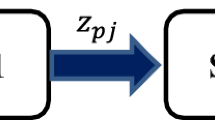Abstract
This paper presents a new input-output orientation data envelopment analysis (DEA) model for estimating most productive scale size (MPSS) based on possibility measure, in which the inputs and outputs are assumed to be represented by fuzzy variables with known membership functions. When the fuzzy inputs and outputs are trapezoidal fuzzy variables, the proposed model is transformed into its equivalent linear programming form. Furthermore, the sensitivity analysis of the proposed model are discussed. At last, to illustrate the application of the proposed method, fuzzy data of 12 flexible manufacturing systems (FMSs) are used to determine which FMS is possibilistic MPSS.
Access this chapter
Tax calculation will be finalised at checkout
Purchases are for personal use only
Similar content being viewed by others
References
Aldamak, A., Zolfaghari, S.: Review of efficiency ranking methods in data envelopment analysis. Measurement 106, 161–172 (2017)
Assani, S., Jiang, J.L., Cao, R.M., Yang, F.: Most productive scale size decomposition for multi-stage systems in data envelopment analysis. Comput. Ind. Eng. 120, 279–287 (2018)
Banker, R.D.: Estimating most productive scale size using data envelopment analysis. Eur. J. Oper. Res. 17, 35–44 (1984)
Charnes, A., Cooper, W.W., Rhodes, E.: Measuring the efficiency of decision making units. Eur. J. Oper. Res. 2(6), 429–444 (1978)
Cooper, W.W., Thompson, R.G., Thrall, R.M.: Extensions and new developments in DEA. Ann. Oper. Res. 66, 3–45 (1996)
Ehrgott, M., Holder, A., Nohadani, O.: Uncertain data envelopment analysis. Eur. J. Oper. Res. 268, 231–242 (2018)
Eslami, R., Khodabakhshi, M., et al.: Estimating most productive scale size with imprecise-chance constrained input-output orientation model in data envelopment analysis. Comput. Ind. Eng. 63(1), 254–261 (2012)
Hatami-Marbini, A., Emrouznejad, A., Tavana, M.: A taxonomy and review of the fuzzy data envelopment analysis literature: two decades in the making. Eur. J. Oper. Res. 214, 457–472 (2011)
Jahanshahloo, G.R., Khodabakhshi, M.: Using input-output orientation model for determining most productive scale size in DEA. Appl. Math. Comput. 146, 849–855 (2003)
Khodabakhshi, M.: Estimating most productive scale size with stochastic data in data envelopment analysis. Econ. Model. 26, 968–973 (2009)
León, T., Liern, V., Ruiz, J.L., Sirvent, I.: A fuzzy mathematical programming approach to the assessment of efficiency with DEA models. Fuzzy Sets Syst. 139(2), 407–419 (2003)
Lertworasirikul, S., Fang, S.C., Joines, J.A., et al.: Fuzzy data envelopment analysis (DEA): a possibility approach. Fuzzy Sets Syst. 139, 379–394 (2003)
Liu, S.T.: A fuzzy DEA/AR approach to the selection of flexible manufacturing systems. Comput. Ind. Eng. 54, 66–76 (2008)
Meng, M.Q.: A hybrid particle swarm optimization algorithm for satisficing data envelopment analysis under fuzzy chance constraints. Exp. Syst. Appl. 41, 2074–2082 (2014)
Peykani, P., Mohammadi, E., et al.: Fuzzy data envelopment analysis: an adjustable approach. Exp. Syst. Appl. 136, 439–452 (2019)
Sahoo, B., Khoveyni, M., Eslami, R., Chaudhury, P.: Returns to scale and most productive scale size in DEA with negative data. Eur. J. Oper. Res. 255(2), 545–558 (2016)
Wang, Y.M., Lan, Y.X.: Estimating most productive scale size with double frontiers data envelopment analysis. Econ. Model. 33, 182–186 (2013)
Wen, M.L., Zhang, Q.Y., et al.: Some new ranking criteria in data envelopment analysis under uncertain environment. Comput. Ind. Eng. 110, 498–504 (2017)
Author information
Authors and Affiliations
Editor information
Editors and Affiliations
Rights and permissions
Copyright information
© 2021 The Author(s), under exclusive license to Springer Nature Switzerland AG
About this paper
Cite this paper
Meng, M., Liu, L. (2021). An Input-Output Orientation Model for Estimating Most Productive Scale Size in Fuzzy Data Envelopment Analysis. In: Meng, H., Lei, T., Li, M., Li, K., Xiong, N., Wang, L. (eds) Advances in Natural Computation, Fuzzy Systems and Knowledge Discovery. ICNC-FSKD 2020. Lecture Notes on Data Engineering and Communications Technologies, vol 88. Springer, Cham. https://doi.org/10.1007/978-3-030-70665-4_81
Download citation
DOI: https://doi.org/10.1007/978-3-030-70665-4_81
Published:
Publisher Name: Springer, Cham
Print ISBN: 978-3-030-70664-7
Online ISBN: 978-3-030-70665-4
eBook Packages: Intelligent Technologies and RoboticsIntelligent Technologies and Robotics (R0)




